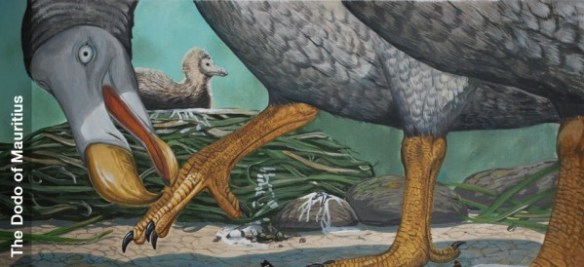 Birds On The Edge and Durrell: an evening with Dr Julian Hume of the Natural History Museum
Birds On The Edge and Durrell: an evening with Dr Julian Hume of the Natural History Museum
In the footsteps of a hairdresser: Dodos, giant tortoises and the fossil record of the Mascarenes
Jersey Zoo Discovery Centre – 1900 on 11th November 2017
Animals and plants on islands often evolve in isolation of those on the mainland – a widely studied discipline know as island biogeography (see e.g. site here). Without the same pressures that their relatives might be facing the island forms can become very different to their ancestors. And not just species but the ecosystems that they live in may be very different, having been sculpted by a different set of influences – in the absence of predators unlikely species can become dominant or become landscape engineers like the tortoises in the Galapagos or the Indian Ocean islands and geese and geese-like ducks in Hawaii.
However, when the balance of these ecosystems is upset the whole thing can come crashing down. Unique animals, plants, whole ecosystems can disappear. Typically, and perhaps unsurprisingly, the usual culprit that brings about these crashes, or least usual for the last few millennia, is us humans. With help of course, from the plants and animals that come with us.
 Closer to the mainland, the wildlife and ecosystems of the Channel Islands, may not seem like classic examples of island biogeography. However, like more distant oceanic islands we currently have no native predatory mammals (several introduced ones) and none of the normal natural grazers to keep vegetation in check (not since we became islands probably) the latter roles currently partially filled by introduced rabbits and, at least in places, by managed sheep and cattle. And like the Mascarenes, Hawaii and New Zealand we are seeing the impacts of man and the animals and plants we like to surround ourselves with.
Closer to the mainland, the wildlife and ecosystems of the Channel Islands, may not seem like classic examples of island biogeography. However, like more distant oceanic islands we currently have no native predatory mammals (several introduced ones) and none of the normal natural grazers to keep vegetation in check (not since we became islands probably) the latter roles currently partially filled by introduced rabbits and, at least in places, by managed sheep and cattle. And like the Mascarenes, Hawaii and New Zealand we are seeing the impacts of man and the animals and plants we like to surround ourselves with.
Birds On The Edge welcomes Dr Julian Hume, a recognised authority on islands, their unique species, their ecosystems  and just what can go wrong with them when man gets involved. Julian will give a talk on Friday 11th November at Jersey Zoo. Julian has authored many books on extinct birds, globally and particularly from the Hawaiian and Mascarene Islands (Mauritius, Reunion and Rodrigues). However, Julian is much more than an author though, his intense research into his subjects has included reconstructing and painting species known only from bones or travellers notebooks and establishing their niche in ecosystems once untroubled by
and just what can go wrong with them when man gets involved. Julian will give a talk on Friday 11th November at Jersey Zoo. Julian has authored many books on extinct birds, globally and particularly from the Hawaiian and Mascarene Islands (Mauritius, Reunion and Rodrigues). However, Julian is much more than an author though, his intense research into his subjects has included reconstructing and painting species known only from bones or travellers notebooks and establishing their niche in ecosystems once untroubled by
humans.
 An expert on the dodo, a species very familiar to Channel Islanders, Julian will talk about his research into the birdlife of Mauritius and his most recent discoveries on the life and observations of Etienne Thirioux, the hairdresser and amateur naturalist, whose contribution to the fossil record of Mauritius has never been bettered. Julian will illustrate his talk with contemporary artwork and his own paintings. He will reflect too on just how easily islands and their natural inhabitants can be changed for ever.
An expert on the dodo, a species very familiar to Channel Islanders, Julian will talk about his research into the birdlife of Mauritius and his most recent discoveries on the life and observations of Etienne Thirioux, the hairdresser and amateur naturalist, whose contribution to the fossil record of Mauritius has never been bettered. Julian will illustrate his talk with contemporary artwork and his own paintings. He will reflect too on just how easily islands and their natural inhabitants can be changed for ever.
Please come along to this free presentation at Jersey Zoo’s Discovery Centre (formerly the Princess Royal Pavilion) at 1900 on Saturday 11th November. Please come to Zoo entrance a few minutes before 1900 for access.
Julian P Hume website
Julian P Hume Wikipedia





I like to book 2 places for Birds on the Edge at Durrel
On Saturday 11th November
Many thanks
Jane
Of course, just come along! We’ll see you there on the 11th.
Hi Glyn,
Maggie and I are looking forward to this exciting event.
Please keep 2 seats for us.
Best wishes,
Tony Allchurch
Will do. See you there!